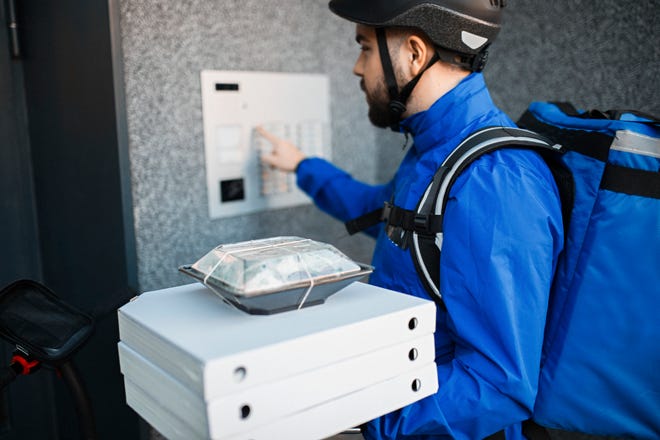

DoorDash and Uber are pushing back against measures that set a minimum pay standard for delivery drivers in Seattle. New York City and Seattle are the first two cities in the U.S. to pass a minimum wage law for food gig delivery workers.
During their quarterly earnings call Wednesday, Uber CEO Dara Khosrowshahi warned that these minimum pay laws, “hurt the people that its supposed to protected,” GeekWire reported.
These multi-billion dollar companies have ramped up efforts to alter pay regulations for delivery drivers in Seattle. In March, DoorDash spent $130,000 on lobbying to “repeal the app-based delivery worker minimum pay ordinance,” according to King 5 News in Seattle.
Now, the Seattle City Council is considering changes to the wage standard law that went into effect in January. The law sets a minimum that companies like DoorDash, GrubHub, Instacart and other food delivery apps must pay their drivers.
Food delivery companies are required to pay their drivers at least 44 cents per minute, plus 74 cents per mile during orders, or a minimum of $5 per order. Uber Eats and DoorDash responded to the law by adding a $5 fee to every order placed. Some businesses have already reported sharp declines in delivery orders.
Food delivery companies push back against minimum wage law
In response to the minimum wage law, Uber Eats and DoorDash added an extra $5 fee to every order, requiring consumers to shoulder additional costs. One restaurant owner in Seattle told Eater that a $54 order for pickup at his restaurant costs $85 when ordered through Uber Eats.
In an email sent to KNKX Public Radio, a spokesperson for DoorDash said the city’s new pay standards for delivery drivers were “excessive” and that the company added fees to “offset labor costs,” according to the news outlet.
DoorDash reported a $2.5 billion revenue in their first quarter of the year, and a net loss of $25 million.
According to its quarterly earning’s report, Uber’s Delivery operations raked in $3.2 billion for the first quarter of 2024, with adjusted profits of $528 million.
What are the proposed changes to the minimum wage law?
The initial law passed in 2022 requires drivers are paid $5 per order, or 44 cents per minute, plus 74 cents per mile.
The proposed changes would require apps to pay drivers 33 cents per minute and 35 cents a mile. Workers would only be paid for time spent picking up and delivering order.
Seattle previously passed legislation that caps how much app companies can charge restaurants.
How are businesses and workers reacting to the law?
Spice Waala, a small chain restaurant in Seattle shared on Instagram that they’ve experienced a 30% decrease in delivery sales. They said the decline is “largely attributed to the $5 surcharge the City of Seattle imposed to help with minimum wage problems for those drivers.”
Some restaurants say they will cover the $5 dollar charge from delivery apps like Uber Eats and DoorDash.
In a City Council meeting on Tuesday, some drivers spoke out against the law saying their income had declined due to lack of orders. Other drivers showed support for the minimum wage law because they say the extra pay went farther to cover expenses.
In a press release from late March, Seattle Councilmember Tammy Morales said, “We should not repeal labor protections every time billion-dollar corporations hike fees on customers without justifying those fee increases. That would allow corporations to extort our political process.”
What to know:Fast food chains, workers are bracing for California’s minimum wage increase
Gig economy:California Pizza Huts lay off all delivery drivers ahead of minimum wage increase
The future of the minimum wage law looms over Seattle
The responsibility over who should pay for these additional labor costs is being tossed between consumers and food delivery companies.
The nonprofit, Worker Washington said in a recent report that the proposed law would lower drivers net pay to $13.17 per hour, due to payroll taxes and mileage costs.
DoorDash said the current law requires the company to pay drivers at least $26.40 per hour of active delivery time – although some drivers have said the amount of money they take home is less than that.
Other cities with food delivery apps rely on independent contractors to deliver food – these workers do not qualify for the local minimum wage pay.
Seattle’s City Council will determine if the wage standard law stays intact or if driver pay should be reduced to $19.97 an hour worked – the current minimum wage in Seattle. The proposed bill is scheduled to be discussed further in the coming weeks.






